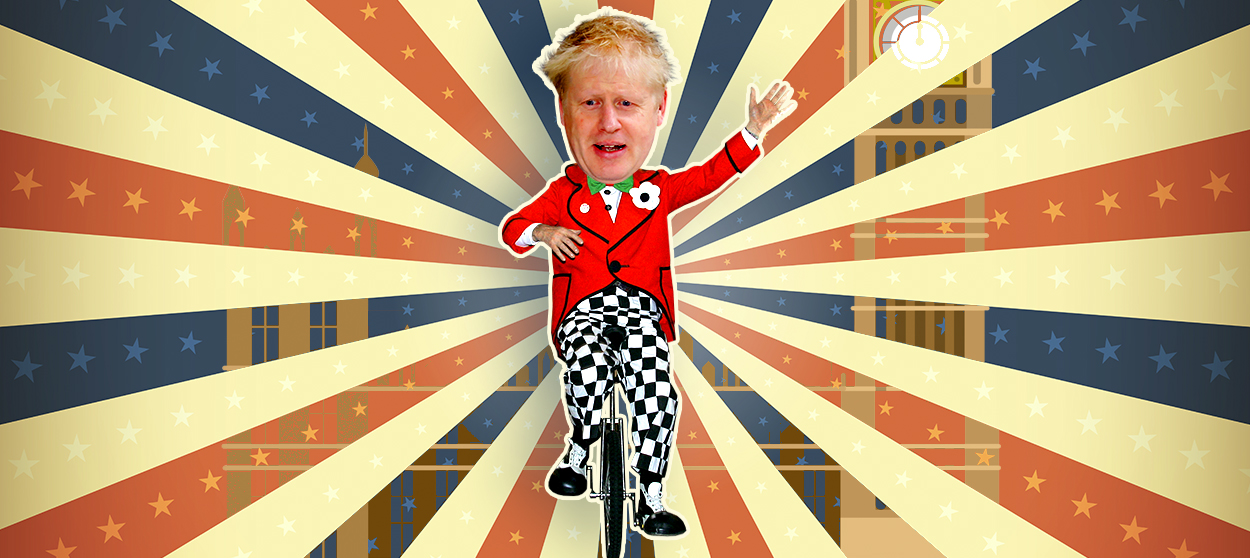Boris Johnson is unfit
Electing him as the U.K.'s next prime minister would be a disaster


A free daily email with the biggest news stories of the day – and the best features from TheWeek.com
You are now subscribed
Your newsletter sign-up was successful
If Brexit were a three-ring circus, Boris Johnson would be the clown riding a unicycle in the background that constantly interrupted the rest of the show. But as surreal as it seems, Brexit is real. Whether and how the U.K. might leave the European Union remain open questions. But damage from the process has already been done, and more is sure to come. Just how much depends in large part on who Britain chooses as its new prime minister. And somehow, the circus clown is being touted as the next ring leader.
How did it come to this?
After the 2016 Brexit referendum, Theresa May took over as prime minister. As PM, she honored the EU referendum's result with red lines that left little room for negotiation. Then, in early 2017, she triggered Article 50, setting a time bomb for the U.K.'s EU membership. She followed that with a snap election in an attempt to consolidate power. That fiasco cost her party — the Tories — control of Parliament, along with precious negotiating time. The party maintained a tenuous grip via a questionable deal with Northern Ireland's Democratic Unionist Party, but they were effectively powerless.
The Week
Escape your echo chamber. Get the facts behind the news, plus analysis from multiple perspectives.

Sign up for The Week's Free Newsletters
From our morning news briefing to a weekly Good News Newsletter, get the best of The Week delivered directly to your inbox.
From our morning news briefing to a weekly Good News Newsletter, get the best of The Week delivered directly to your inbox.
Eventually, May arrived at terms that met the EU's requirements — but the deal divided her party. A vote followed that gave May the worst parliamentary defeat in nearly a century. She pressed on for four agonizing months, losing another vote on the deal and preparing for a third before admitting defeat. As May announced she would step down, Boris Johnson straightened his tie and licked his chops.
Johnson has since been proclaimed May's likely successor — a clear sign of an unhealthy media environment that's drawn to cacophony and spectacle. It's also a sign of the weakness of the field. But that's the consequence of a political party that's locked in a death spiral. You only get entrants whose desire to lead the charge overrides their fear of the looming cliff. In that regard, Johnson is a real standout. But his urges do not seem paired with a yearning, or even a mild desire, to lead his people. Sadly, he seems set to endlessly clamor for attention to fill a void inside himself. Worse yet, his eagerness to pervert the truth and his seemingly relentless focus on power and adulation all combine to make him a dangerous candidate.
Falsehoods have long been hallmarks of Johnson's career. His first break in the world of journalism ended ingloriously as he was fired by the Times for fabricating a quote. He later tried to cover up an affair, which led to his being sacked from the Tory front bench. In that incident, he was quoted as saying that he insisted on being fired, "because it is only by being sacked that you can truly engender empathy." He added that nothing elicited compassion like "the sight of seeing you ker-splonked on the Tarmac with your propeller buried six feet under." This is Exhibit A in the case against his being a statesman and for his being a master manipulator.
Dalliances with the truth (and otherwise) aside, Johnson somehow managed to become a mainstay in the British media. Fast forward to 2018, he resumed his weekly column at The Telegraph after leaving his post as foreign secretary. He said the column took just 10 hours a month to produce, yet the side hustle would earn him an extra £275,000 a year. To him, it was "chicken feed." But to the median U.K. household, it was several times their disposable income. After they leave office, Cabinet members must wait three months before taking on any external work and they need to receive approval before doing so for the first two years. Boris didn't ask permission and his first post went up a week after he stepped down.
A free daily email with the biggest news stories of the day – and the best features from TheWeek.com
A few weeks later, Johnson wrote a column on burqas — the traditional head-covering veil worn by some Muslim women — in which he claimed that any woman who showed up on campus "looking like a bank robber" ought to be asked to remove the garment. Though he stopped short of calling for a ban, he called the burqa "oppressive and ridiculous."
Responses poured in as both citizens and MPs took Boris to task. Labour MP David Lammy lambasted Johnson, calling him the U.K.'s "pound-shop Donald Trump" as he accused him of "fanning the flames of Islamophobia to propel his grubby electoral ambitions." Baroness Warsi, the first Muslim woman to be a member of a U.K. Cabinet, warned that "ugly comments can actually enhance reputations" while creating an environment in which hate crimes are more likely to occur. A poll from Sky News seemed to support Warsi's comments: Sixty percent of its respondents did not find Johnson's comments to be racist. Only 45 percent thought he should apologize, while 59 percent believed burqas should be banned. So much for redress from an angry public.
The calculated attempt to foster and benefit from xenophobia appears to have worked. Stephen Bannon, the alt-right agitator and President Trump's former strategist, said Johnson had "nothing to apologize for." In his eyes, the former foreign minister had the potential to be a great PM. Bannon's support for Johnson ought to give us all pause. As should the echoes of Trump's behavior in Johnson's own. His campaign launch event emulated Trump's treatment of the press as he took control of the conversation while his supporters booed the journalist who had the gall to question his character. Johnson also skipped the first debate for PM candidates. If we can't get him to answer to the people when he's auditioning for the role, what hope is there of his doing so once he's got it?
If the British people are looking for a leader who's in touch with the corrosive effects of inequality, who will speak truth to power, and eschew temptation in service of the people, Boris is not that leader. If they're looking for a principled person who won't fan the flames of hate and division for personal benefit, rather than the embodiment of a self-aggrandizing windsock, Boris is not that leader. If they're looking for a leader who's in touch with reality, and willing to face facts with the people, rather than contorting it and imperiling both marginalized groups and those who would hold him to account, Boris is not that leader.
From a distance, it feels like Europe's electorate is leading a shift in civil society toward the far right. Worrisome news reports capture our attention, but elections are electoral income statements. When those quantitative snapshots shift from ebbing and flowing to surging towards problematic leaders, it's cause for real concern. As an MP, or even just as a public figure, Johnson could foster significant damage. As prime minister, however, his opportunity to bend ears and wills would increase by orders of magnitude. As Johnson himself has said: "There are no disasters, only opportunities. And, indeed, opportunities for fresh disasters."
Chris Oestereich is the publisher of the Wicked Problems Collaborative and the director of publications at Thammasat University’s School of Global Studies. He is the author of a book about Brexit, The Dividing Kingdom, and the editor of What Do We Do About Inequality?
